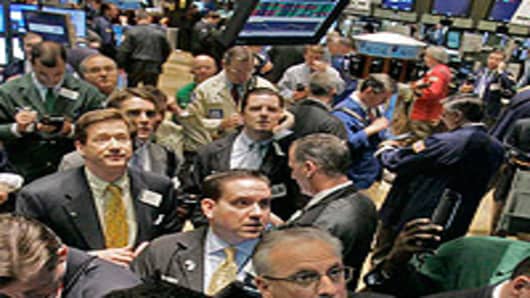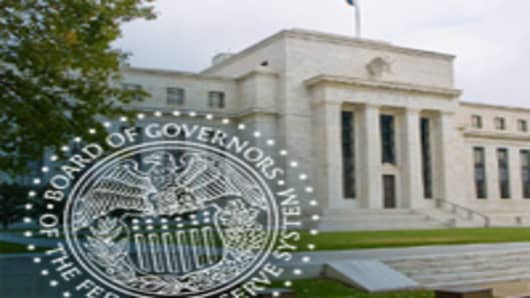A weak jobs picture is raising expectations that the Fed may take new measures to cure the economy's ills.
The Fed's one-day meeting Tuesday trumps everything else for markets in the week ahead, as the earnings season winds down. Retail sales, trade and inflation data are also on the calendar, but the Fed's perception of the economy and any hint it may reconsider quantitative easing have the markets on edge, particularly after Friday's disappointing July jobs report.
As stocks declined Friday, buyers flocked to bonds and yields ripped lower. The 2-year and 5-year notes hit all-time low yields, and the 10-year was yielding 2.82 percent Friday, its lowest level since April, 2009. More supply comes to market next week, when the Treasury auctions $74 billion in 3-year and 10-year notes and 30-year bonds Tuesday through Thursday.
"It's dramatic because we are now entering the period called the 'pain trade,'" said George Goncalves, chief Treasury strategist for Nomura Americas. "Everyone's been on a buyers' strike because they thought yields were too low, and now they're going to chase them even lower. People hated (10-year) bonds when they were at 4 percent, and now they love them when they're under 3 percent."
Jefferies managing director Art Hogan said the markets are now waiting to see what the Fed does, after the July jobs report showed a steep decline of 131,000 non farm payrolls. That compares to an expected 65,000 decline. The total includes the creation of only 71,000 private sector jobs, below June's 83,000. It also includes the anticipated elimination of 143,000 temporary census jobs, plus the surprising elimination of 50,000 state and local government workers.
"When (Fed Chairman Ben) Bernanke spent a couple of days on Capital hill recently, and he downgraded the view on the economy, that was preparing us for something interesting," Hogan said.
"That puts us in a wait-and-see mode," he said.
Whither Stocks
Stocks finished the week higher, helped by a reversal of early Friday's steep losses. The Dow was up 1.8 percent at 10,653, and the S&P 500 was up 1.8 percent at 1121. The Nasdaq was up 1.5 percent at 2288, but the Russell 2000 was down 0.2 percent on the week at 650. The dollar also weakened, setting a three-month low against the euro and approaching a 15-year low against the yen
Stock traders, meanwhile, are debating whether the summer rally has run its course, now that earnings season is coming to a close and the economic data remains weak. By Friday, about 90 percent of S&P 500 companies had reported, with profits rising an average 38 percent. Seventy-five percent of the companies reporting beat earnings estimates. Among the companies reporting in the coming week are Cisco, Disney and some of the major retailers, like Macy's.
"I think they've (stocks) run a little too far. We're not terribly surprised by some pull back here. This has been, and can be perceived as, a short covering rally," said Tobias Levkovich, chief U.S. equities strategist at Citigroup.
Levkovich said earnings though have been a positive. "They've definitely been good. The question is really is it sustainable?" he said.
He notes that when stocks began to sell off in April, a contrarian measure he watches was at a high, and it is getting close to the same level now. He notes that in late April, 70 percent of analysts' earnings revisions were to the upside. As the market fell, that number declined to a level of about 45 percent in June, and negative revisions outweighed the positive. At that point, the market was about to rally back. Currently, he said the level of positive revisions has risen again, to a level of about 65 percent.
Levkovich expects stocks to stay choppy through the summer, but he says they could bounce after the mid-term election.
"The market is going to have to process the mid-terms—the lame duck session and how we're going to process the Bush tax cut expiration. That's pretty meaningful for 2011 prospects. That's the elephant in the room," he said.
Goldman Expects 'Baby Steps'
Fed Ahead
Market direction will be shaped in a big way in the coming week by the outcome of the Fed's meeting.
Goldman Sachs economists Friday said they expect the Fed to take a "baby step" toward unconventional easing by announcing that it will reinvest the proceeds from maturing mortgage-backed securities in the bond market. They also expect the Fed, by the end of the year or early next year, to carry out a major purchase of Treasury securities to battle a rising unemployment rate. That could amount to $1 trillion in Treasury purchases, they said.
The Goldman economists, at the same time, downgraded their expectations for economic growth next year. They now expect GDP to grow by just 1.5 percent for the first half, the same as their expectation for the second half of 2010.
"We don't mean to suggest it's a panacea. Incrementally, we think easing financial conditions and heading off any significant decline in financial expectations is helpful. We don't think the Fed can solve all of the economy's problems, but you want to ideally forestall additional problems," said Goldman economist Andrew Tilton in an interview.
The Fed's mortgage holdings are retired at an estimated rate of $100 to $150 billion annually, and it's not clear whether they would reinvest in mortgages, Treasurys or both, Tilton said. "It's not a lot of bang for the buck, but there's some bang for the buck, but it also makes it even clearer that the Fed is very far away from raising rates," he said.
The idea is that the Fed would reinvest the funds to keep them in the banking system, as opposed to draining them from the financial system.
Goncalves took a similar position earlier in the week, and he believes the Fed will say it will use the proceeds of maturing debt to purchase government debt. "It would require a massive Fed QE in order to fight the deflation that's being priced in by the bond market. Our current view is the Fed has to come out with something next week but it's not going to be as specific as what the markets are begging for, and that's going to be a let down. They want to know how the Fed plans to fight deflation," he said.
"Our core view is they will change the language...They are going to say they are going to do it. They have to buy Treasurys. It just drops more cash into the economy," he said.
Barclays Capital chief U.S. economist Dean Maki does not agree that the Fed will embark on quantitative easing. "Our baseline forecast says the Fed doesn't do any additional stimulus," he said.
"If they do make a change in policy that will be a signal that they lost confidence in their forecast, and the outlook and if that's all they do is make a relatively mild change in reinvestment policy, that's like them saying that things have worsened a lot," Maki said. "We don't think they have to so in that case, they are much better off giving a signal of confidence that they do think the recovery will proceed and make a more major change later if they do get a major negative later on."
Maki thinks the Fed will maintain its cautious outlook and may make a change in its language about inflation. It previously altered its view to say inflation risks had lessened. "With commodities and energy prices up since the last meeting, that doesn't seem appropriate. That's now been revised away," he said.
Mesirow Financial chief U.S. economist Diane Swonk also believes the Fed will hold its fire in this meeting. "I still think they're not going to do anything, although the discussion on doing something will certainly continue, and we have improving financial conditions against the backdrop of a deteriorating economy. So it's tough,
At the end of the day, one of the things the Fed does not want to be known as, is as not trying to do something when it could have if the economy does fall apart. That's something down the road. If things get much worse than they are, and they don't turn around, they certainly will do all that they can," Swonk said.
Econorama
The important data in the coming week includes retail sales on Friday, but Tilton says it will also be important to watch Thursday's weekly jobless claims, which crept up in the past week.
"If you have another move up, that's going to be a red flag for a lot of people," he said. Jobless claims are expected to be 465,000, down slightly from the past week's 479,000.
Data to watch in the coming week also includes the NFIB small business survey Tuesday. Productivity and costs and wholesale trade are also reported that day. On Wednesday, there is international trade, and import prices are released Thursday. CPI, consumer sentiment and business inventories are reported Friday.
Earnings Central
There is still a small group of companies reporting earnings in the coming week. Dish Network, Liberty Media, Scripps Networks, Tyson Food, Clear Channel, McDermott International and Qiagen report Monday.
Disney reports after Tuesday's closing bell, and Cisco , Computer Sciences and Macy's report Wednesday.
Thursday's reports include Kohl's, Estee Lauder, Sara Lee, Urban Outfitters, Autodesk, Nordstrom and Nvidia. JCPenney reports Friday.
More From CNBC.com:
Questions? Comments? Email us at marketinsider@cnbc.com




